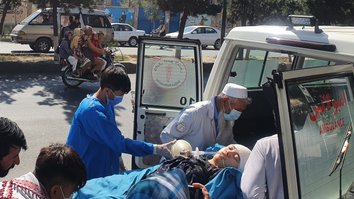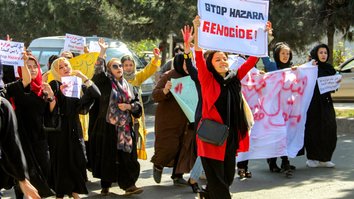KABUL -- A month after losing her eye in a deadly suicide bombing of her academy, a young Hazara woman has finished among the top candidates in Afghanistan's tough university entrance exam (Kankor).
Results issued over the weekend showed Fatima Amiri scored 313 points out of a possible 360 in the Kankor, a highly competitive test that more than 100,000 students took this year to win a coveted university place.
The top student got 355, but anything above 300 puts students in the very highest category.
"I am happy to have succeeded in the field of my choice," Fatima said Monday (November 7). "But I am not satisfied with my score. I was aiming for more."
![Kabul student Fatima Amiri, 17, is seen here at her home in the city's Dasht-e-Barchi neighbourhood on Novembr 7. [Wakil Kohsar/AFP]](/cnmi_st/images/2022/11/08/38537-Kabul-wounded-student-585_329.jpg)
Kabul student Fatima Amiri, 17, is seen here at her home in the city's Dasht-e-Barchi neighbourhood on Novembr 7. [Wakil Kohsar/AFP]
![Kabul student Fatima Amiri and her father, Sayed Hassan Agha, are seen here at their home in the city's Dasht-e-Barchi neighbourhood on November 7. [Wakil Kohsar/AFP]](/cnmi_st/images/2022/11/08/38538-Fatima-Amiri-exams-585_329.jpg)
Kabul student Fatima Amiri and her father, Sayed Hassan Agha, are seen here at their home in the city's Dasht-e-Barchi neighbourhood on November 7. [Wakil Kohsar/AFP]
It was a courageous achievement by the 17-year-old, who has said she wants to study computer science.
She was badly injured in the September 30 attack on the Kaaj Higher Educational Centre in the Kabul neighbourhood of Dasht-e-Barchi, which coaches young men and women ahead of the Kankor.
A suicide bomber entered the hall and walked to the front -- where girls and young women had been segregated -- then detonated a bomb that took at least 54 lives.
Most of those in the hall were from Afghanistan's minority Hazara community.
No group has so far claimed responsibility for the attack, but the "Islamic State of Iraq and Syria" (ISIS) has carried out several deadly attacks in the area targeting schools, mosques and members of the Hazara community.
In April, a series of bombings hit two education centres in Dasht-e-Barchi, killing at least six and wounding 24. No group claimed responsibility.
In May last year, at least 85 people -- mainly female students -- were killed and about 300 were wounded when three bombs exploded near their school in Dasht-e-Barchi.
Again, no group claimed responsibility, but in October 2020 ISIS claimed a suicide attack on an educational centre in the same area that killed 24 and injured more than 50.
Education is tough
Education for girls like Fatima is tough enough, even without the threat of ISIS attacks.
Afghan girls, now in their second year of being barred from education after sixth grade, are struggling to keep learning nonetheless.
More than one million teenage girls have been deprived of education across the country over the past year, according to the United Nations Assistance Mission in Afghanistan (UNAMA).
Secondary schools for girls across the country have been closed, but some private colleges -- like the one Fatima was attending -- remain open. Other girls seek to continue their education by taking home-based classes.
Fatima was still recovering from her wounds when she sat for the exams -- blinded in one eye and deaf in an ear.
"I was happy to be able to take the exam, but my pain did not allow me to be very happy," she said, tears welling.
"The day of the exam I felt the absence of my friends."
When the results were announced, she rushed to the scene of the tragedy to pay tribute to them.
"I went there and told my friends who were martyred that I have succeeded," she said. "I have to continue my studies for them even if it's hard."
Top scorers on the Kankor have the choice of the best courses at the leading universities, but Fatima's dream now is the opportunity to study abroad.
"I'm sure that if I study here, the same incident will happen again and I could lose my life," she said.








From an area of Nangarhar (Achin district), which was a nest of ISIS and brutal killings were carried out for years, the leaders of the area were bombed and blasted, and the biggest bomb (the mother of bombs) was used, so far, there is no cropping, no livestock in that area, and even the children who are newly born there are blind, or are suffering from goiter or other diseases; a girl reached her year's long goal in this year's university entrance (kankor) examination. She fulfilled the marks to join the faculty of Computer Science. The father encouraged his daughter and proudly posted her and his photos on social media. Each of our girls and each young man has special talents, but it is not known because they are not given chances. Otherwise, if there were equal opportunities for our youth and no problems, I am sure this country would develop and prosper in every aspect. She wished for a prosperous and self-sufficient Afghanistan.
Reply4 Comment
If there were no war, each of our young men and women would have shown their unique abilities, but unfortunately, our mind is filled with the hateful screams of war and the smoke of bullets. We were born, we grew young, we became adults, we became old, and we died in the battle, but what we see now every day, the reality, is that Afghanistan is going in a better direction. Your news is a firm slap in the face to those who say women's education in Afghanistan is a cultural issue. I say that our culture teaches us to study and reach our goals independently, like this disabled dear sister. With the advent of the new system, all the attention is on women, but it is negative; however, the positive thing is that these same women can play a constructive role in the positive change of society. In Ghazni, a private television called Muslim held a contest of Serat-u-Nabi (biography of the prophet), and a girl won first place among a thousand people. This girl is a student in the eighth grade and is 12 years old and named Salma. So, the world's intelligence, which has closed the doors of our schools in the face of girls under various pretexts, will be able to push back the Afghans? Never, and we will always go to the light...
Reply4 Comment
Please don't create differences among the Afghans under the names of Hazara, Tajik, Pashtun, Uzbek and this and that. We all are Afghans. From this part of your text, it appears that you intentionally want to create differences among Afghans. Please refrain from doing this. With respect, Ali
ReplyI agree with Ali’s words. Please do not create disunity among Afghans. We are all Afghans. In the last 45 years and since the decade of the constitution in Afghanistan, Iran, Russia, France, and some other countries have been trying to create ethnic and religious differences among the people of Afghanistan. In this series, Iran and Saudi Arabia create religious differences. Russia, Iran, and France create ethnic differences and encourage minority groups to fight against most Pashtuns. The blood of Pashtun, Hazara, Tajik, and Uzbek... has the same color. We are all Afghans. Pashtuns are the most affected by the cursed thought of ISIS. In several districts of Nangarhar, ISIS has committed many atrocities and killed many people.
Reply4 Comment